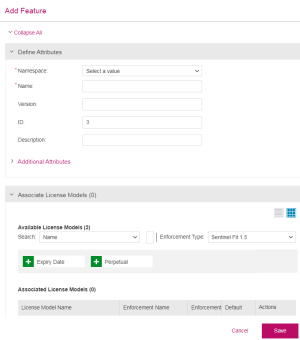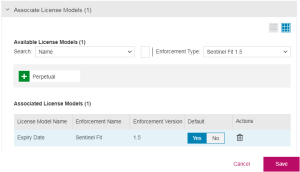Features
|
>Lifecycle Stages of a Feature |
New to Sentinel EMS?
|
What is a Feature?
A feature is a distinct functionality in a software application that can be independently licensed. Features are the basic building blocks of a product. You can bundle one or more features into a product according to your product monetization model. This lets you charge your customers per feature, giving your customers the flexibility to purchase only those features and capabilities that they actually need.
Sentinel EMS provides you the flexibility to add license models to each feature of your products. This helps to secure them and generate different types of licenses for a product according to your requirement. A feature may be a module, a specific functionality such as Print, Save, or Draw, or an entire application.
For example:
Suppose you want to create a product called MySampleCalculator. You might include the following features:
| F1 | Add |
| F2 | Subtract |
| F3 | Multiply |
| F4 | Divide |
As part of your product monetization model, you might roll out the following flavors of the same product to the market:
>MySimpleCalculator (Add, Subtract)
>MyAdvancedCalculator(Add, Subtract, Multiply, Divide)
This lets you charge different prices according to feature usage.
Lifecycle Stages of a Feature
The lifecycle stage of a feature is defined by the Deployed attribute:
>Deployed: The feature is included in a product that is part of an entitlement.
>Not Deployed: A feature is not deployed if the following is true:
•The feature is not included in any product, OR
•None of the products containing the feature are included in any entitlements.
The date when a feature is created is available as the Creation Date attribute on the Features page. The current system date is automatically stored as Creation Date during creation of a feature.
Prerequisites for Creating a Feature
The following are the prerequisites for creating a feature:
>Permission (role) to create a feature must be available to the user.
>Namespace must be available if you want to place the feature in a specific workspace.
Creating a Feature
From the navigation pane, select Catalog > Features to view the Features page. The Add Feature button on the Features page is used to create a feature. The page to create a feature is given below:
Important
The following are the points to remember while creating a feature:
>Duplicate "feature name + version" combination is not allowed in Sentinel EMS.
>You cannot remove the existing license models from a feature that is already deployed.
Feature Attributes
The following table explains the feature attributes:
| Attribute | Description | Required/Optional | Valid Values |
|---|---|---|---|
| Namespace |
The namespace in which the feature is stored. This attribute is visible only if more than one namespace is available. |
Required |
>Alphanumeric >1 to 500 characters |
| Name | Name of the feature. The validity of the Feature Name is enforcement-specific. This means that the validity of the feature name depends on the enforcement in use. | Required |
>Alphanumeric >1 to 24 characters >Cannot contain the following characters: < > % ^ & ” [ ] $ ! # spaces >Cannot contain the following words: 011 and Ni |
| Version | Version of the feature. Duplicate "Feature Name + Version" combination is not allowed in Sentinel EMS. | Optional |
>Alphanumeric >0 to 11 characters >Cannot contain the following characters: < > % ^ & ” [ ] $ ! # spaces >Cannot contain the following words: 011 and Ni |
| ID | Unique identifier for feature. |
Required |
>Must be unique >Numeric >Valid value is from 0 to 999999999 |
| Description | Additional information about the feature. | Optional |
>Alphanumeric >0 to 500 characters |
|
Additional Attributes |
|||
| Ref ID 1 | Reference identifier that identifies the feature in an external system. | Optional |
>Alphanumeric >0 to 100 characters |
| Ref ID 1 | Reference identifier that identifies the feature in an external system. | Optional |
>Alphanumeric >0 to 100 characters |
| External ID | External reference identifier that identifies the feature in an external system. | Optional |
>Unique across Sentinel EMS for all features. >Alphanumeric >0 to 100 characters |
Associate License Models
After providing the attribute details, use the Associate License Models pane displayed below to associate license models with the feature you are creating.
NOTE Enforcement Type is displayed only if more than one enforcement type is available.
The points to remember when you associate a license model with a feature:
>You must add at least one license model to a feature.
>If multiple license models are associated with a feature, you must mark one of them default by setting the Default toggle button to "Yes".
>Click ![]() for a license model to remove it from the Associated License Model list.
for a license model to remove it from the Associated License Model list.
Actions for Features
The following table lists the actions available for features:
| Action | Description | ||
|---|---|---|---|
|
Updates information for an existing feature. Note: >Modifying a download definition requires appropriate permissions. For details, see Roles. >You can modify details for features that are not deployed. >For deployed features: •The license model association which are marked as default for a product cannot be removed from the feature. •For an entitlement, the license model associations of a feature cannot be removed. >For deployed features that have been activated: •Feature name, version, feature ID cannot be modified. •Feature license model association, which are marked as default for a product cannot be removed. •For an entitlement, the license model associations of a feature cannot be removed.
|
||
|
Deletes a feature. Available for non-deployed features. Note: A feature can be deleted if it is used in a product that is in draft state. |
||
|
Copies an existing feature to create a new one. The new feature is identical to the copied feature. Edit these details maintaining validity of each attribute and save to create a new feature. |

